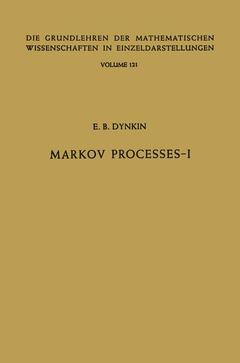Markov Processes, Softcover reprint of the original 1st ed. 1965 Volume I Grundlehren der mathematischen Wissenschaften Series, Vol. 121/122
Langue : Anglais
Auteur : Dynkin E. B.

The modem theory of Markov processes has its origins in the studies of A. A. MARKOV (1906-1907) on sequences of experiments "connected in a chain" and in the attempts to describe mathematically the physical phenomenon known as Brownian motion (L. BACHELlER 1900, A. EIN STEIN 1905). The first correct mathematical construction of a Markov process with continuous trajectories was given by N. WIENER in 1923. (This process is often called the Wiener process.) The general theory of Markov processes was developed in the 1930's and 1940's by A. N. KOL MOGOROV, W. FELLER, W. DOEBLlN, P. LEVY, J. L. DOOB, and others. During the past ten years the theory of Markov processes has entered a new period of intensive development. The methods of the theory of semigroups of linear operators made possible further progress in the classification of Markov processes by their infinitesimal characteristics. The broad classes of Markov processes with continuous trajectories be came the main object of study. The connections between Markov pro cesses and classical analysis were further developed. It has become possible not only to apply the results and methods of analysis to the problems of probability theory, but also to investigate analytic problems using probabilistic methods. Remarkable new connections between Markov processes and potential theory were revealed. The foundations of the theory were reviewed critically: the new concept of strong Markov process acquired for the whole theory of Markov processes great importance.
One Contraction semigroups of linear operators on Banach spaces.- Two Infinitesimal operators of transition functions.- Three Markov processes.- Four First entrance and exit times and the intrinsic topology in the state space.- Five Characteristic operators of Markov processes. Differential generators of diffusion processes.- Six Functionals of Markov processes.- Seven Stochastic integrals.- Eight Nonnegative additive functionals of a Wiener process.- Nine Transition functions, corresponding to almost multiplicative functionals.- Ten Transformations of Markov processes.- Eleven Stochastic integral equations and diffusion processes.- Twelve Excessive, superharmonic and harmonic functions.- Thirteen Harmonic and superharmonic functions associated with strong Feller processes. Probabilistic solution of certain equations.- Fourteen The multi-dimensional Wiener process and its transformations.- Fifteen Continuous strong Markov processes on a closed interval.- Sixteen Continuous strong Markov processes on an open interval.- Seventeen Construction of one-dimensional continuous strong Markov processes.- § 1. Measurable spaces and measurable transformations.- § 2. Measures and integrals.- § 3. Probability spaces.- § 4. Martingales.- § 5. Topological measurable spaces.- § 6. Some theorems on partial differential equations.- § 7. Measures and countably additive set functions on the line and corresponding point functions.- § 8. Convex functions.- Historical-bibliographical note.- List of symbols.- List of symbols.
Date de parution : 01-1965
Date de parution : 08-2012
Ouvrage de 366 p.
15.5x23.5 cm
Thème de Markov Processes :
Mots-clés :
Brownian motion; Law of large numbers; Markov; Markov process; Probability theory
© 2024 LAVOISIER S.A.S.



